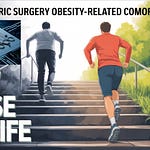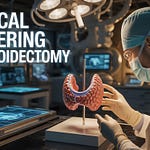Reviewed by Dr.
, General SurgeonFounder | Surgical Pioneering Newsletter and Podcast Series
Editorial Board Member | Genesis Journal of Surgery and Medicine
Surgical Endoscopy
https://doi.org/10.1007/s00464-025-12017-4
Accepted: 13 July 2025
Summary
The "ScopePro Trainer" system is a newly developed, low-cost, portable laparoscopic box simulator designed for training and objective assessment of psychomotor laparoscopic skills. Utilizing computer vision and passive markers on instruments, ScopePro Trainer differentiates itself by its ability to track and analyze not only linear motion but also the crucial angular (rotational) motion of surgical instruments, which is often overlooked by traditional simulators. A validation study successfully demonstrated its capacity to differentiate between novice, intermediate, and expert surgeons across various laparoscopic tasks. This system offers a significant advancement in surgical training by providing objective, personalized feedback, potentially enhancing the transfer of skills to the operating room.
Key Themes and Important Ideas/Facts
1. The Growing Need for Advanced Laparoscopic Skill Training and Objective Assessment
Minimally Invasive Surgery (MIS) Benefits and Skill Demands: MIS offers "many well-proven benefits" and is increasingly adopted, but it "requires the surgeon to develop a range of skills," including "hand–eye coordination, depth perception, and psychomotor skills."
Limitations of Traditional Simulators: While both virtual and physical simulators (box trainers) exist, virtual simulators are often high-cost and lack realistic haptics, while many box trainers provide less information, particularly regarding "angular motion, such as rotation around its axis."
Importance of Rotational Motion: Laparoscopic surgery involves "four degrees of freedom," and "Rotational movements around the axis are essential." Current simulators often only analyze linear motion (3 DoF), leaving out the critical "4th DoF (rotation around the z-axis)."
Gap in Objective Feedback: The lack of feedback on rotational movements "limits the ability to provide objective feedback on movement control in 3D space, which is crucial for improving laparoscopic psychomotor skills."
2. Introduction and Features of the ScopePro Trainer System
Objective: The study's objective is "to present the ScopePro Trainer system and evaluate construct validity."
System Description: ScopePro is a "low-cost, portable laparoscopic box simulator equipped with an optical recording system utilizing passive markers to measure the rotation of the laparoscopic instrument tip along its traditional linear motion."
Technology: It uses a 10 mm USB camera for visual feedback and a pair of webcams inside the trainer to register "position and rotation of instruments for each hand." Programming is done using Python, incorporating OpenCV for image processing and distortion correction.
Rotation Measurement: A key innovation is the use of "passive marker[s]...shaped like a spiral" which leverage the "linearity principle of the spiral" to convert the "step of a spiral" into a rotation angle. This allows for recording "rotation around the instrument's axis."
Cost-Effectiveness: The functional prototype had an approximate cost of "500 USD," highlighting its potential as a "low-cost option for institutions." Its portability also allows "individuals interested in practicing their skills at home" to benefit.
3. Validation Study Design and Methodology
Participants: The study involved 32 participants categorized into three groups:
Novices (N): 20 medical students with "no prior experience in laparoscopic surgery."
Intermediates (I): 8 pediatric surgery residents (PGY-2 to PGY-4) who had performed "fewer than 10 laparoscopic surgical procedures."
Experts (E): 4 pediatric surgeons who had performed "more than 100 laparoscopic procedures."
Tasks: Participants performed three FLS-based laparoscopic tasks:
Peg Transfer: Bimanual manipulation, grasping, hand-eye coordination, spatial perception.
Pattern Cutting: Cutting, grasping, precision, hand-eye coordination.
Intracorporeal Knots: Needle manipulation, suture management, knot tying, bimanual dexterity. This was considered "the most difficult task in this study."
Metrics: Six metrics were used for assessment, related to time, linear motion, and angular motion:
Time (T)
Path Length (PL)
Clockwise Turns (Nclk)
Counterclockwise Turns (Ncclk)
Total Number of Turns (NT)
Ratio (R): "The relationship between instrument rotation (NT) and total path length. (revolutions/meter)" – interpreted as economy of turns.
Statistical Analysis: ANOVA and Student's t-test with Tukey's correction were used to identify significant differences between groups (p ≤ 0.05).
4. Key Findings and Outcomes
Differentiation of Skill Levels: The ScopePro Trainer "successfully validated" its ability to "differentiate between participants with varying levels of laparoscopic expertise."
Motion Metrics as Indicators of Expertise:
"Time, Path length, Clockwise turns, Counterclockwise turns, and Total turns...showed a tendency to decrease their magnitude as the experience level increased."
"The Ratio metric indicates the correlation between the number of turns and the instrument path, which can be interpreted as the economy of turns." This ratio tended to increase with skill level, suggesting experts achieve more turns per unit of path length.
Task-Specific Differentiation:
Intracorporeal Knots: This task showed "the most significant statistical differences" across skill levels, with "significant differences observed in 4 of 6 metrics."
Pattern Cutting: Experts "demonstrated significantly better bimanual dexterity," making "more simultaneous movements of the two instruments."
Peg Transfer: "Counterclockwise turns" for the right hand and "Ratio" for the left hand were distinguishing metrics.
Qualitative Observations: Graphical representations of instrument paths showed a "more compact" pattern for experts, "less compact" for intermediates, and "scattered and erratic" for novices, indicating greater accuracy by experts.
Importance of Rotational Metrics: "Notably, both the number of turns and the ratio metrics were able to distinguish between different skill levels in some instances, where the traditional path length associated with linear motion could not."
Ambidexterity and Learning Curve: The study suggests a learning process where "dominant hand movements improving first and non-dominant hand movements showing more improvement with increased experience," potentially leading to "ambidextrous behavior in experts."
5. Future Directions and Impact
Integration into Training Programs: ScopePro Trainer "could be integrated into surgical training programs...in the initial stages of training, focusing on basic technical skills training." It could also be a "complementary tool in simulators."
Further Validation and Research:
Need for "more expert participants" to build a robust database for automatic objective evaluation.
Expand validation to "other centers and laparoscopic surgeons from other specialties."
Determine if "new video-based metrics apply to other tasks."
Conduct "longitudinal studies to research the impact of the system on improving the learning curve of aspiring surgeons, as well as to quantify whether the use of the ScopePro system results in fewer operative errors."
Assess "face and content validity" using the Messick validity framework.
Transferability of Skills: Future studies will also "help determine if the acquired skills are transferable to the operating room."
Non-invasive and Portable Solution: The system offers a "non-invasive solution for tracking and analyzing the rotational movements of laparoscopic instruments along their axis without altering the surgeons' natural performance." Its portability makes it suitable for "surgical training programs to teach future surgeons."
Conclusion
The ScopePro Trainer system successfully validates its construct validity and presents a promising, low-cost alternative for objectively assessing laparoscopic psychomotor skills, particularly through its innovative analysis of instrument rotational motion. By addressing a critical gap in traditional training methods, ScopePro has the potential to significantly enhance surgical education and contribute to the development of more competent and efficient laparoscopic surgeons.
To access additional details, please refer to the Surgical Pioneering Podcast Series application available at the following link:










